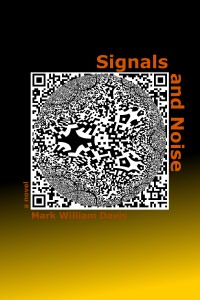 States of consciousness satisfy wildly different conceptions with equanimity. Here we have epiphenomenalism, where the feeling, the self, the I, are all freeloaders on some deeper commingling of logical prescriptions and mathematical calculations. We can stop right here, though, and track about in the cathedral of those subjective essences, reveling in each distorted recollection and episodic fumbling, worried that we are deflating the heart of the matter, the emotional character, draining out the seed that is essentially who we are. With time hanging like this—stopped, frozen—the propositions and their statistical basis functors start to rise into clarity, and the ripples of their influence trickle into sensibility. I did in fact do that, say that, because it did in fact make sense. I am aware of that now and the blip of clarity, momentary as it was, reflects that underlying matrix of contending feelings, driving hopes, and social posturing.
States of consciousness satisfy wildly different conceptions with equanimity. Here we have epiphenomenalism, where the feeling, the self, the I, are all freeloaders on some deeper commingling of logical prescriptions and mathematical calculations. We can stop right here, though, and track about in the cathedral of those subjective essences, reveling in each distorted recollection and episodic fumbling, worried that we are deflating the heart of the matter, the emotional character, draining out the seed that is essentially who we are. With time hanging like this—stopped, frozen—the propositions and their statistical basis functors start to rise into clarity, and the ripples of their influence trickle into sensibility. I did in fact do that, say that, because it did in fact make sense. I am aware of that now and the blip of clarity, momentary as it was, reflects that underlying matrix of contending feelings, driving hopes, and social posturing.
But here we have dualism, reflecting every folk psychological wire in our hypothetical soul. We are distinct and apart from our bodies, like parasites hitching a ride, implanted by some god or first principle back behind our brow ridge. Oh, yes, we are subjects of the body and brain, but we are also their master. We command, they obey, at least until they buck and collapse under duress, laziness, and pain. The signals come back in and there is not enough will, despite our separation behind the bunkered walls of gauges. There is not enough will, somehow, to push a bit further, because we are in fact the fatigue, the pain, the boredom. We realize this at those passing moments when we are at the limit and the structures seem too porous for there to be any reason to the proposition. Yet, once again, the next morning, we wake to the default position and are in command again, not noticing the irony in needing to clear our head with coffee, to get on task, to conquer the residue of sleep that clouds our minds. Even the ownership empowers the broken metaphor: “our minds.” We have no minds. We are mind.
Zach was in a trance, having run through a three-phase meditation exercise that began with a breath, a centering, and a focused visualization of a small green ball floating in a pool. It was part of the exercise to try to stop worrying about the details of textures and colors and settle on some representation that was adequate enough for holding a mental focus. The pool changed from day to day. The ball was always neon green, though, with fluorescence pulsing along the seams and at the corners. The ball stood out against even the chlorinated brilliance of the pool water, against the rippling sapphire.
The second phase was more physical and less eidetic. By pure concentration, relaxation was impressed on the entire body, beginning with the toes. It actually felt more like vibration to Zach. He wasn’t sure exactly what relaxation felt like, but knew that by the time he finished moving up and along the lines of his body, ending with a final tumble down across his nose and into his cheeks and lips, that he would more often than not be drifting into a hypnagogic peace. He sometimes would take the final deep breath that concluded the second phase and just sleep, hearing faintly the distant sounds of the city in repose.
But if he made it through that phase there was a final visualization that crossed imagining sensations like being on an elevator with an inchoate claim about drifting into a void, an abyss. There was a countdown process, going deeper, deeper, deeper, until finally Zach was fully quiescent. Yet there he was, his body frozen with the tingle of extended non-motion, and as the meditative entrainment and procedural mantras ended, he was back and self-aware, refusing to break the physical lock-down for minutes as his mind began to reassert the coded blur of imagery and words. He would sometimes try to tamp it down, but it was like stuffing cotton balls in a dyke. The mind is porous—unkempt—he thought, then wanted to unthink it.